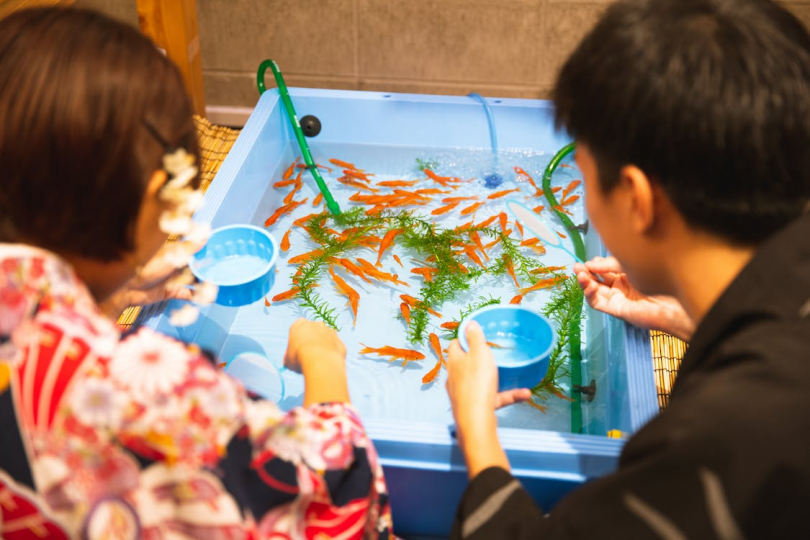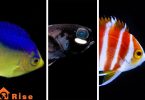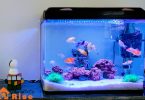Unlike fish living in their natural environment, aquarium fish have different requirements when it comes to food. Choosing the Right Aquarium Fish Food can be quite tricky. How much nutritional requirements your aquarium fish requires highly depends on the age and species of the fish. Carnivores will not take care of green food because the younger ones will require more protein.
If you want to keep your fish in good condition then it is crucial to provide them with the right type of food just like the accurate aquarium setup. Selecting the right diet which should or shouldn’t be high-fiber fish food also depends on the eating habits and eating frequency. If you have fish of a certain nature such as day dwellers, nocturnal fish, bottom feeders, or top feeders then specific fish food ingredients consideration would be compulsory.
You will also need to look for alternate food options as well to provide a proper diet. In this post, we will discuss the ways to find the right food for aquarium fish.
How To Read Fish Food Labels
When choosing the right fish food for your aquarium, nutrition is of the utmost importance. To make sure you’re providing your fish with the appropriate nutrients or high-fiber fish food then you will first need to understand what’s on the label. Here are four tips to help you read fish food labels to find the best food for fish in an aquarium:
- Look at the ingredients list. This will give you a good overview of what’s in the food and how it was made. Avoid foods with high levels of artificial colors or preservatives, as these can be harmful to your fish.
- Consider the caloric content. Foods with a high caloric content will help your fish stay healthy and active. However, make sure that there are no excessive amounts of sugar or salt present; both can be harmful to your fish.
- Check the vitamin and mineral content. Many fish foods contain vitamins and minerals that are beneficial to your aquarium fish. Make sure that the food contains enough of each nutrient for your setup.
- Read the reviews. Once you’ve decided which food is best for your tank, check online reviews to see if other saltwater aquarium enthusiasts have had success with that specific food type and called it the best food for saltwater fish.
- Feeding Guide. If you want to buy the best food for saltwater fish then make sure this selected fish food has a proper guidelines regarding how to feed the fish. You can learn all you need about feeding your fish this particular brand of food from the feeding guide on the package. The necessary amount in grams or ounces will be supplied, along with the size and age reference. The brands may specify how frequently your fish should eat this meal as well as an approximate daily limit in some cases.
- Manufacturing And Expiration Date. The manufacturer’s address, a phone number to contact if you have any questions about the product, the date the item was manufactured, and its expiration date are all listed on a tiny portion of the label.
It’s crucial to buy food with an expiration date (also called the expiration date) at least 6 to 12 months in advance of that date. Fish should only be fed fresh food since food that has gone bad has lost its nutritional value over time.
Fish Nutritional Information
When it comes to choosing the right aquarium fish food then knowing about the fish food ingredients and nutrition is a key factor to consider. Different types of fish require different types of food, and knowing what to look for on the labels can help make the right choice for your fish. Some factors to consider when choosing aquarium fish food include the type of aquatic animal your fish is intended to mimic in nature, its dietary needs (such as protein, vitamins, and minerals), and your own personal preferences.
Be sure to read the ingredients list carefully, and compare it to the nutritional requirements listed for your fish species on Wikipedia or similar resources. In addition to reading ingredient lists, be sure to familiarize yourself with the ratings given to various brands of aquarium fish food by reputable review websites. If you are still unsure about Choosing the Right Aquarium Fish Food, consult with a veterinarian or an experienced aquarist.
Types Of Right Aquarium Fish Food
When it comes to choosing the right aquarium fish food ingredients, there are a few things you need to consider. Firstly, you need to decide what type of fish you’re feeding. Secondly, you need to look at the nutrition labels on the food. And finally, you need to make sure the food is compatible with your aquarium setup. When it comes to fish food types, there are three main types: flake, pellet, and tablet. Flake and pellet foods are made up of small pieces that can be easily eaten by fish.
Tablet foods:
They are smaller than pellets but bigger than flakes, and they dissolve in water. Granules fish food type is the kind of fish food that resembles crooked breadcrumbs. Although the size and shape of each granule vary, all granule-based fish feeds are excellent for feeding smaller kinds of fish. Small young fish who have trouble chewing bigger pellets are better suited for micro granule fish food.
Live food
This is often considered to be the best for wild fish and carnivores. They are high-fiber fish food that is suited mostly for fish like small sharks and other carnivores. However, live food is a bit expensive but you can select frozen food that is less expensive but offers the same nutritional value to fish.
The main thing to remember when choosing aquarium fish food is to find something that has best nutritional value. for your specific type of fish. Some examples of good aquarium fish food include Hikari Algae Formula for Cichlids, Tetra Food Granules For Pelleted Fish, and Tetra One Flake Food For Catfish.
Finally, make sure the food you choose is compatible with your aquarium setup. For example, some foods are best for fresh or saltwater setups. While others are only suitable for marine setups. So choose carefully and even better, talk to an expert Vet regarding the type of best food for saltwater fish.
Which Aquarium Fish Food Is Right Aquarium Fish Food?
Choosing the right aquarium fish food can be tricky, especially if you’re not familiar with all the different types of best saltwater fish foods. Nutrition is a big part of choosing the right food for your fish. Some brands have specific labels that indicate they’re good for specific fish species. Here are four tips to help choose the right food for your fish:
–Check The Fish Food Labels.
Many aquarium fish foods come in a variety of flavors. So it’s important to find one that your fish will love. Look for foods with a variety of textures, including pellets, flakes, and tablets. Some foods also come in liquid form so you can add them directly to the tank.
–Consider Your Fish’s Dietary Needs.
Some fish need high-quality protein sources, while others need more carbohydrates or high-fiber fish food. Pay close attention to what is on the label and what is all about. Consult a pet store or aquarium expert. Best if you have questions about what type of food is best for your pet.
–Think About Your Tank Size And Layout.
Some tanks have particular designs for certain types of fish food. While others can accommodate a wider range of diets. Make sure to choose food that will fit into your tank without taking up too much space.
Bottom Line
Fish are one of the unique pets that can be a beautiful addition to your home’s interior. Because of their living environment and type of aquarium, you can use them as accent pieces of furniture as well. When it comes to choosing the right aquarium fish food, you will need to understand certain things. Make sure to find the food for fish according to the fish type, species, and feeding requirement.
It won’t be wrong to say that what you feed to your aquarium fish will decide what the fish is. Feeding the fish with the right type of food can be tricky. Just make sure to get the right one by knowing the type of your fish to work better. Follow our pet care blog for easier pet care tips and guides.







